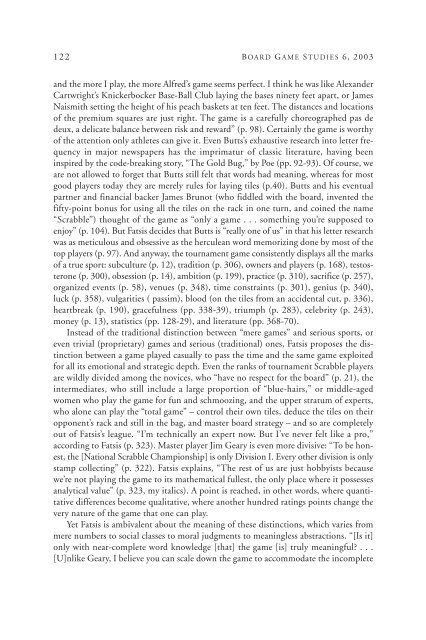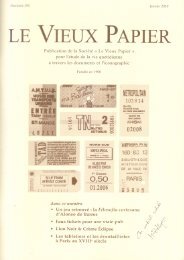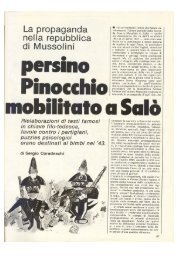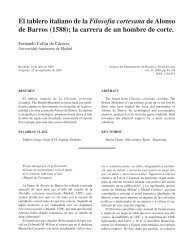Board games from the city of Vijayanagara (Hampi ... - Gioco dell'Oca.
Board games from the city of Vijayanagara (Hampi ... - Gioco dell'Oca.
Board games from the city of Vijayanagara (Hampi ... - Gioco dell'Oca.
You also want an ePaper? Increase the reach of your titles
YUMPU automatically turns print PDFs into web optimized ePapers that Google loves.
122<br />
B OARD G AME S TUDIES 6, 2003<br />
and <strong>the</strong> more I play, <strong>the</strong> more Alfred’s game seems perfect. I think he was like Alexander<br />
Cartwright’s Knickerbocker Base-Ball Club laying <strong>the</strong> bases ninety feet apart, or James<br />
Naismith setting <strong>the</strong> height <strong>of</strong> his peach baskets at ten feet. The distances and locations<br />
<strong>of</strong> <strong>the</strong> premium squares are just right. The game is a carefully choreographed pas de<br />
deux, a delicate balance between risk and reward” (p. 98). Certainly <strong>the</strong> game is worthy<br />
<strong>of</strong> <strong>the</strong> attention only athletes can give it. Even Butts’s exhaustive research into letter frequency<br />
in major newspapers has <strong>the</strong> imprimatur <strong>of</strong> classic literature, having been<br />
inspired by <strong>the</strong> code-breaking story, “The Gold Bug,” by Poe (pp. 92-93). Of course, we<br />
are not allowed to forget that Butts still felt that words had meaning, whereas for most<br />
good players today <strong>the</strong>y are merely rules for laying tiles (p.40). Butts and his eventual<br />
partner and financial backer James Brunot (who fiddled with <strong>the</strong> board, invented <strong>the</strong><br />
fifty-point bonus for using all <strong>the</strong> tiles on <strong>the</strong> rack in one turn, and coined <strong>the</strong> name<br />
“Scrabble”) thought <strong>of</strong> <strong>the</strong> game as “only a game . . . something you’re supposed to<br />
enjoy” (p. 104). But Fatsis decides that Butts is “really one <strong>of</strong> us” in that his letter research<br />
was as meticulous and obsessive as <strong>the</strong> herculean word memorizing done by most <strong>of</strong> <strong>the</strong><br />
top players (p. 97). And anyway, <strong>the</strong> tournament game consistently displays all <strong>the</strong> marks<br />
<strong>of</strong> a true sport: subculture (p. 12), tradition (p. 306), owners and players (p. 168), testosterone<br />
(p. 300), obsession (p. 14), ambition (p. 199), practice (p. 310), sacrifice (p. 257),<br />
organized events (p. 58), venues (p. 348), time constraints (p. 301), genius (p. 340),<br />
luck (p. 358), vulgarities ( passim), blood (on <strong>the</strong> tiles <strong>from</strong> an accidental cut, p. 336),<br />
heartbreak (p. 190), gracefulness (pp. 338-39), triumph (p. 283), celebrity (p. 243),<br />
money (p. 13), statistics (pp. 128-29), and literature (pp. 368-70).<br />
Instead <strong>of</strong> <strong>the</strong> traditional distinction between “mere <strong>games</strong>” and serious sports, or<br />
even trivial (proprietary) <strong>games</strong> and serious (traditional) ones, Fatsis proposes <strong>the</strong> distinction<br />
between a game played casually to pass <strong>the</strong> time and <strong>the</strong> same game exploited<br />
for all its emotional and strategic depth. Even <strong>the</strong> ranks <strong>of</strong> tournament Scrabble players<br />
are wildly divided among <strong>the</strong> novices, who “have no respect for <strong>the</strong> board” (p. 21), <strong>the</strong><br />
intermediates, who still include a large proportion <strong>of</strong> “blue-hairs,” or middle-aged<br />
women who play <strong>the</strong> game for fun and schmoozing, and <strong>the</strong> upper stratum <strong>of</strong> experts,<br />
who alone can play <strong>the</strong> “total game” – control <strong>the</strong>ir own tiles, deduce <strong>the</strong> tiles on <strong>the</strong>ir<br />
opponent’s rack and still in <strong>the</strong> bag, and master board strategy – and so are completely<br />
out <strong>of</strong> Fatsis’s league. “I’m technically an expert now. But I’ve never felt like a pro,”<br />
according to Fatsis (p. 323). Master player Jim Geary is even more divisive: “To be honest,<br />
<strong>the</strong> [National Scrabble Championship] is only Division I. Every o<strong>the</strong>r division is only<br />
stamp collecting” (p. 322). Fatsis explains, “The rest <strong>of</strong> us are just hobbyists because<br />
we’re not playing <strong>the</strong> game to its ma<strong>the</strong>matical fullest, <strong>the</strong> only place where it possesses<br />
analytical value” (p. 323, my italics). A point is reached, in o<strong>the</strong>r words, where quantitative<br />
differences become qualitative, where ano<strong>the</strong>r hundred ratings points change <strong>the</strong><br />
very nature <strong>of</strong> <strong>the</strong> game that one can play.<br />
Yet Fatsis is ambivalent about <strong>the</strong> meaning <strong>of</strong> <strong>the</strong>se distinctions, which varies <strong>from</strong><br />
mere numbers to social classes to moral judgments to meaningless abstractions. “[Is it]<br />
only with near-complete word knowledge [that] <strong>the</strong> game [is] truly meaningful? . . .<br />
[U]nlike Geary, I believe you can scale down <strong>the</strong> game to accommodate <strong>the</strong> incomplete







